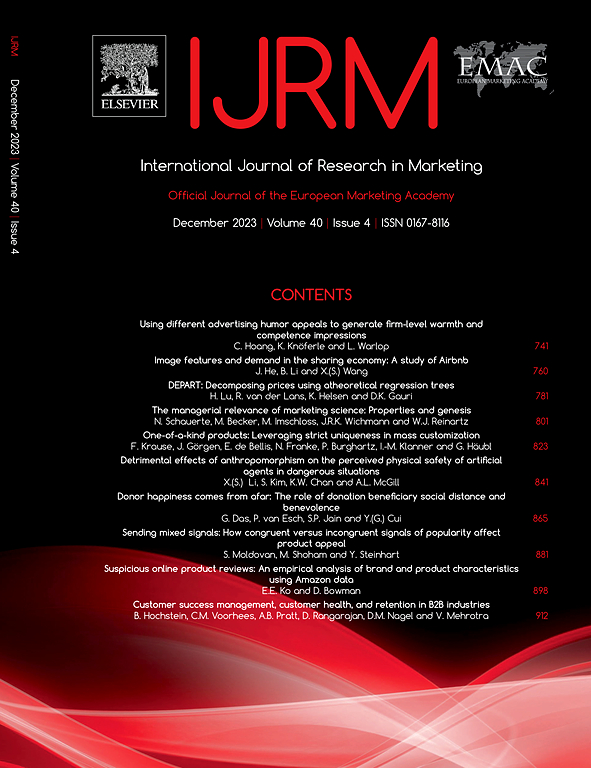Winning seats: Contingency selling in markets with limited capacity and diverse preferences
IF 7.5
2区 管理学
Q1 BUSINESS
International Journal of Research in Marketing
Pub Date : 2025-06-01
DOI:10.1016/j.ijresmar.2024.10.001
引用次数: 0
Abstract
This paper examines an emerging pricing model, contingency selling, for markets where the product is sold in advance with attribute uncertainty and capacity constraint. A typical example is tournament ticket sales for sports events where it is uncertain whether a particular team will appear in the game. The model enables the firm to sell tickets in a contingent fashion, i.e., some tickets will be valid only if a certain team gets into the game. When consumers (fans) have sufficiently different preferences for different products (games with different teams), selling these “contingent tickets” better matches the price with the willingness-to-pay of particular consumer segments (fans of specific teams). Exploiting state-based price discrimination and belief heterogeneity, contingent tickets generate a higher margin per seat than the traditional way of selling general tickets, especially when there are supply constraints. We further show that contingency selling continues to be advantageous in the presence of secondary markets where consumers purchase tickets in advance but can trade tickets once they know which team will be in the game. We extend our model to examine the impacts of consumer optimism bias and fan base asymmetry. Finally, we compare contingency selling with alternative selling mechanisms to demonstrate the robustness of our results and illustrate the situations where this new selling model is more (or less) advantageous.
赢得席位:在容量有限、偏好多样化的市场上进行应急销售
本文研究了具有属性不确定性和产能约束的产品提前销售市场的一种新兴定价模型——权变销售。一个典型的例子是体育赛事的比赛门票销售,其中不确定特定球队是否会出现在比赛中。该模型使公司能够以偶然的方式出售门票,也就是说,只有当某个球队进入比赛时,一些门票才有效。当消费者(球迷)对不同的产品(不同球队的比赛)有足够不同的偏好时,销售这些“偶然门票”可以更好地将价格与特定消费者群体(特定球队的球迷)的支付意愿相匹配。利用基于国家的价格歧视和信仰异质性,偶然门票比传统的普通门票销售方式产生更高的每座位利润,特别是在存在供应限制的情况下。我们进一步表明,在二级市场中,应急销售仍然是有利的,在二级市场中,消费者可以提前购买门票,但一旦他们知道哪支球队将参加比赛,他们就可以交易门票。我们扩展我们的模型来检验消费者乐观偏见和粉丝基础不对称的影响。最后,我们比较了偶然性销售与替代销售机制,以证明我们的结果的稳健性,并说明了这种新的销售模式更多(或更少)有利的情况。
本文章由计算机程序翻译,如有差异,请以英文原文为准。
求助全文
约1分钟内获得全文
求助全文
来源期刊
CiteScore
11.80
自引率
4.30%
发文量
77
审稿时长
66 days
期刊介绍:
The International Journal of Research in Marketing is an international, double-blind peer-reviewed journal for marketing academics and practitioners. Building on a great tradition of global marketing scholarship, IJRM aims to contribute substantially to the field of marketing research by providing a high-quality medium for the dissemination of new marketing knowledge and methods. Among IJRM targeted audience are marketing scholars, practitioners (e.g., marketing research and consulting professionals) and other interested groups and individuals.

 求助内容:
求助内容: 应助结果提醒方式:
应助结果提醒方式:


